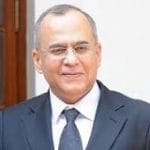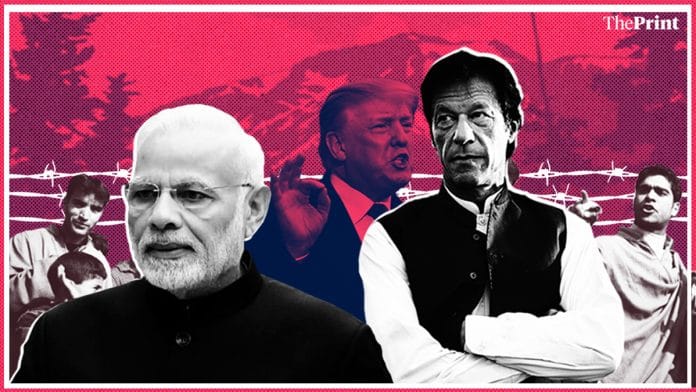US President Donald Trump Monday offered to help resolve the Kashmir dispute between India and Pakistan. He said, “If I can help, I would love to be a mediator.” He also suggested that PM Narendra Modi had asked for the US’ help. The Ministry of External Affairs released a statement saying no such help was sought and that the Kashmir issue will be dealt bilaterally with Pakistan.
ThePrint asks: Can India & Pakistan resolve Kashmir bilaterally or is a big-power mediator the only hope?
Trump can help – by ensuring Pakistan stops supporting terrorist outfits and interfering in Kashmir
 Sujit Dutta
Sujit Dutta
Distinguished Fellow, National Security, VIF
India had taken Pakistan’s aggression in Kashmir to the United Nations for a resolution in 1947. The UK and the US, as permanent members of the Security Council, did not make any meaningful effort to implement the UN resolution to end Pakistan’s aggression and hold a plebiscite offered by India. Instead, they built a Cold War alliance in which Pakistan became mired and the military emerged as the dominant force. That alliance has dwindled but its effects linger as Washington relies on Pakistan to tame the Taliban and the Haqqani group of extremists.
China, the other power that has offered to mediate at different times, itself occupies a part of Kashmir and is in close alliance relationship with Islamabad. Neither the US or China nor the UN have the credentials for mediation.
Mediation requires attention to important questions pertaining to the kind of subcontinent we want, religious coexistence and tolerance, economic ties, and peaceful inter-state relations. These are large questions that can only be answered by India and Pakistan working together and discarding enemy images. It also necessitates a fundamental change in Pakistan’s hostile approach towards India and giving up its claims on Kashmir that can never be realised. India, of course, has not asked for any mediation.
President Donald Trump does not seem to comprehend the deep complexities that shape India-Pakistan relations. But he can help by ensuring Pakistan stops all support to terrorist outfits, and its interference in Kashmir. That will create the basis for talks and, perhaps, better relations between India and Pakistan, following which disputes can be peacefully resolved.
Only an impartial country can mediate and break Kashmir deadlock
 Victoria Schofield
Victoria Schofield
Military historian specialising on Kashmir
If the governments of India and Pakistan seriously wanted to resolve the Kashmir issue bilaterally, they could have done so by holding meaningful dialogue. However, to date, the domestic narrative in both countries has always prevented any talks from coming to fruition. Moreover, the dialogue must include representation from the local population to be sustainable.
So, the answer to the question whether ‘a big-power mediator’ is the only hope is that mediation could help to break the deadlock – as Britain found with Northern Ireland. However, such mediation would have to be totally impartial. I don’t think the mediator necessarily has to be a ‘big power’ – any country which is respected by both India and Pakistan, and by the people of Kashmir, could be acceptable. It is, however, crucial that the mediating country is impartial, otherwise either side could cry foul.
But for any mediation to take place, both countries would have to accept the principles of mediation, which, ever since the Simla Agreement was signed in 1972, the government of India has staunchly refused (notwithstanding US President Donald Trump’s recent claim that PM Narendra Modi had invited him to mediate, which the Modi government has denied).
Also read: Trump is no fool & this is why he deliberately lied about Modi’s Kashmir request
Mediation in volatile disputes is not only desirable, but necessary
 Siddiq Wahid
Siddiq Wahid
Senior Fellow, CPR and former VC, Islamic University, Kashmir
The question points to several failures in the Indian government’s policy trajectory on Jammu and Kashmir. One, it illustrates that India and Pakistan have returned to being hyphenated states, highlighting the dysfunctionality of South Asia’s political economy. Two, the Pulwama-Balakot scare alarmed the international community about the danger in not resolving the Kashmir conundrum. Three, it is hard to believe that POTUS made his Kashmir comment without being briefed about “Cashmere” as being more than fine wool.
That said, the Kashmir dispute is not unacquainted with denial and deceit or ignorance and statist self-interest undermining the wishes of its peoples. So, intervention by Trump as a person is not an unqualifiedly promising idea.
However, institutional mediation is much needed because the resolution of the dispute over J&K cannot be left to New Delhi and Islamabad who have failed for over 70 years.
Besides, mediation in volatile disputes is not only desirable, but necessary, as we struggle to find a workable ‘world order’ after the collapse of the one we had three decades ago. Complex conundrums like Kashmir, Palestine, Afghanistan and Tibet are symptoms of a world order based on outmoded systems.
Resolving them would confirm the hopeful presence of stateswomen, men and viable systems among us.
Starting trilateral talks between Pakistan, India and the Kashmiris could be a promising avenue
 Salman Bashir
Salman Bashir
Former foreign secretary of Pakistan
The Kashmir dispute between Pakistan and India has festered for over 70 years. In recent decades, it has acquired a severity with multiple lethal dimensions. India’s stubborn refusal to address the grievances of Kashmiris meaningfully, and its adamant refusal to resume composite talks with Pakistan betray a mindset of stark indifference to ground and regional realities.
Kashmiri struggle for the realisation of their fundamental rights cannot be crushed by force. If the situation is allowed to drift, it can have incalculable consequences. India needs to rethink its policies towards Kashmir. It also needs to realise the futility of its declared policy of isolating Pakistan. In fact, this sham can no longer be justified by New Delhi even to its own people.
Ongoing global and regional developments will compel India to change track or suffer reversals at home and abroad. Recent US offer made by President Donald Trump should serve as an eye-opener for India. Pakistan seeks a peaceful solution to the Kashmir dispute. Be it through the US or United Nations or international mediation or bilateral means. Starting a process of trilateral talks between Pakistan, India and the Kashmiris could be a promising avenue for de-escalating tensions and moving towards a win-win situation.
Also read: Donald Trump is wrong 95% of times, his claims about Modi on Kashmir can’t be any different
If India & Pakistan have no collective will to resolve Kashmir issue, then big-power mediators can’t do much
 Noor Ahmed Baba
Noor Ahmed Baba
Professor, Central University of Kashmir
The Kashmir problem goes back decades and has still not been resolved because perceptions on both sides of the border regarding the conflict are every different.
More than mediation, a degree of facilitation by a friendly power would be beneficial in resolving the problem. However, it is most important to understand that the conflict can only be resolved if there is a collective will to address the issue. If both India and Pakistan want to end the conflict, then the Kashmir issue can be resolved without a big-power mediator. If there is no collective will, then even a mediator will not be able to resolve it.
India and Pakistan need to realise that they live in a time where both countries are interdependent and they cannot prosper in isolation. They are dependent on each other for air space, as was seen when Pakistan shut down its airspace after the Balakot strike, and even for roadways and railways.
Atal Bihari Vajpayee had the will to resolve the Kashmir issue, unfortunately, he did not have enough time. Both countries need to identify Kashmir not as a piece of land, but as a region whose people are suffering. With the correct leadership and the realisation to undo the suffering of the public, the issue of Kashmir can be resolved.
By Revathi Krishnan and Fatima Khan







India has a inhuman government presently having no rights of minorities and brutal force is used against all minorities which has made India more closer to disintegration. Economically unstable, keeps neighbouring countries under pressure to divert attention of its own people and international media. Actual problem is to provide better livelihood to its own people is crushed under these falsely created problems. terrorism is prospering in India while neighbours are wrongly blamed. India has now wrong assumptions to forcefully crush minorities not knowing the power of people, Kashmiris’ r determined to get their right as per united nations resolutions.
Simla agreement provided both India and Pakistan with the opportunity to accept status quo while providing cover against militant domestic constituencies. Pakistan choose to violate that agreement every single day, by waging war against India (a war of a thousand cuts, as they called it). Today, Pakistan is not capable of wresting it militarily even if they could continue the terror war with the same vigor of the 1990s. So, they are simply waiting things out, hoping that in the ensuing decades the tide of history will move in their direction. As a result, there is no real interest in talking. All we are left with posturing on the part of Pakistan, for international consumption and for helping them get more loans and aid. So this question of mediation or peace or talks is moot from the perspective of Pakistan. Indians, of course, waste too much time talking and responding to Pakistani posturing.
UTTER NONSENSE by ALL these so-called “experts” .
India and Pakistan have not resolved Kashmir because of a fundamental issue – Islamic terrorism. Everytime there has been progress – it has been met with intolerable outrages.
Resolving Kashmir now – at the behest of some Paki joker is comical – it condones the Pakistani campaign of terror against India and the damage inflected thereof. India gains NOTHING in return except some unverifiable and unreliable “promise” from Pakistan.
Lastly, “resolving” the Kashmir issue is very different from what Pakistan and India imagine – Pakistan wants control of the Kashmir valley, India will never let that happen. Pakistan wants Indian soldiers out of the Kashmir valley – that will also never happen given Kargil and other Pakistani deceits. The Kashmiri Muslims wants to establish an Islamic republic in the Kashmir valley – the people of Ladhak and jammu will nevef go along with that plan or accept Kashmiri dominance.
Finally, what mediation and role can a “foreign power” play ? And accepting foreing mediation means the Shimla Agreement is meaningless and the 1974 war with Pakistan got India nothing but a piece of paper ?
People who talk of mediate are not just ignorant and naive – but frankly incompetent to assess the realities of the ground scenario. The way to peace is through Trust – Trust cannot be “purchased” through foreign mediation. Further there is no guarantee that any “solution” produced from such mediation will be honored all the parties concerned. Who will take responsibility if Islamic terrorists or Kashmiri terrorists continue their terrorism post “foreign mediation” ?
Let’s start with a basic premise: the Kashmir issue (“problem” if you prefer) can never be solved with the present power architecture of of Pakistan. The Army there not only controls the levers of power, continues to be the most respected and credible institution it has a strong vested interest in continuing the low level conflict with India. It guarantees the not inconsiderable perks of office with no risk. And with the vocal support of mullahs and a populace weaned on ‘Kashmir banega Pakistan’ there’ll never ever be a ‘solution’ with or without third party mediation.
If there is a sincere desire on both sides, mediation is not really necessary. Which is not to discount the contribution common friends can make to break the permafrost that has set in. Both countries have posted their finest diplomats to each other’s capitals, understand the issues, where the red lines are. Whatever ground was covered in talks during the Singh – Musharraf years suggests a lot is possible that the three principal actors can learn to live with peaceably. 2. The immediate concern would be to lower the flame, which is where the US and others can help. Maximalist positions should be avoided. If so much is ( reportedly ) on offer to the Nagas – have never met one in my life – surely there is no propriety in making an issue of foundational covenants like Articles 370 and 35 A. Dr Farooq Abdulla is right when he says there is no prospect of PoK being restored to India. It would be wonderful if this issue gets resolved in our lifetimes. It has held all of South Asia back.